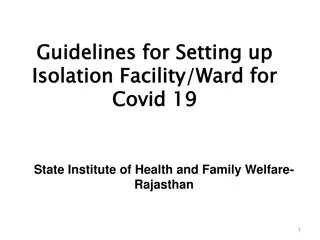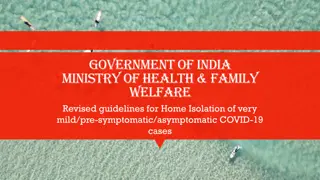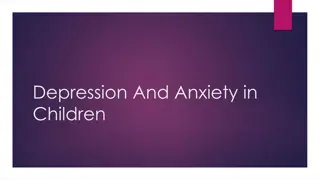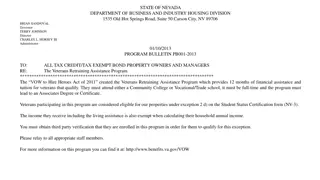Reaching Veterans at Risk of Social Isolation and Depression in Maryland
Maryland Living Well Center of Excellence (LWCE) offers services targeting veterans at risk of social isolation and depression, providing chronic disease management education programs, referrals, workforce certification, screening for social determinants of health, and evidence-based workshops. The center addresses the impact of depression on older adults and the link between social isolation and depression risks.
Download Presentation

Please find below an Image/Link to download the presentation.
The content on the website is provided AS IS for your information and personal use only. It may not be sold, licensed, or shared on other websites without obtaining consent from the author.If you encounter any issues during the download, it is possible that the publisher has removed the file from their server.
You are allowed to download the files provided on this website for personal or commercial use, subject to the condition that they are used lawfully. All files are the property of their respective owners.
The content on the website is provided AS IS for your information and personal use only. It may not be sold, licensed, or shared on other websites without obtaining consent from the author.
E N D
Presentation Transcript
Developments in CfD Andy Hill Head of Research BACP Title of Presentation
What have we achieved? Provided a clearer definition of counselling The term is used in different ways: As an umbrella term covering a wide range of approaches As a more specific intervention as distinct from CBT, psychodynamic etc. Title of Presentation
BACP accredited courses by modality Title of Presentation
Operationalised counselling as specified in the NICE depression guidelines: for people who decline antidepressants, CBT, interpersonal psychotherapy therapy (IPT), behavioural activation, or behavioural couples therapy, consider counselling for people with persistent subthreshold depressive symptoms or mild to moderate depression; offer 6 10 sessions over 8 12 weeks (NICE, 2009, p16) Title of Presentation
Developed an integrative form of humanistic counselling with strong links to contemporary research: Bedi, N., Chilvers, C., Churchill, R., et al (2000) Friedli, K., King, M.B., Lloyd, M., et al. (1997) Goldman, R.N., Greenberg, L.S. & Angus, L. (2006) Greenberg, L.S. & Watson, J. (1998) Marriott, M. & Kellett, S. (2009) Watson, J.C., Gordon, L.B., Stermac, L., et al. (2003) Title of Presentation
3 trials of Person-centred therapy 2 trials compare Person-centred with EFT 1 trial of Process/experiential therapy (EFT) Acknowledging this evidence, CfD integrates aspects of EFT with PCT Title of Presentation
Developed an adaptation of humanistic counselling focused on the treatment of depression: Person-centred and EFT theory has been used to conceptualise depression and provide a strategy for working with this problem Title of Presentation
IAPT money spent on training 2008-09 2009-10 2010-11 2011-12 Therapy 2,190,000 4,430,000 2,620,000 2,680,000 Step 2 Cognitive Behaviour Therapy (CBT) 4,870,000 10,040,000 6,230,000 2,910,000 Step 3 CBT - - 192,000 204,000 Counselling for Depression - - 44,000 (1)207,000 Couple Therapy for Depression - - 189,000 81,000 Brief Dynamic Interpersonal Therapy - - 258,000 246,000 Interpersonal Psychotherapy (1)Includes training fees for the National Institute for Health and Clinical Excellence approved Behavioural Couples Therapy Title of Presentation
Number of therapists trained Number Therapy 2008-09 2009-10 2010-11 2011-12 2012-13 Total 510 727 517 536 459 2,749 Step 2 Cognitive Behavioural Therapy (low intensity) 487 1,004 623 291 322 2,727 Step 3 Cognitive Behavioural Therapy (high intensity) 0 0 64 68 132 264 Counselling for Depression 0 0 44 (1)69 (1)99 212 Couples Therapy for Depression 0 0 63 27 58 148 Brief Dynamic Interpersonal Therapy 0 0 86 82 155 323 Interpersonal Psychotherapy 997 1,731 1,397 1,073 1,225 6,423 Total Title of Presentation (1)Includes trainees undertaking National Institute for Clinical Excellence approved Behavioural Couples Therapy.
IAPT workforce Aug. 2012 census (131/151 services responded) Percentage of total workforce 35 5 40 20 6 26 2 4 2 1 1 2 6 14 5 19 1 1 2 1 1 100 Worker Category Number 2019 304 2323 1175.5 371.5 1547 136 236 123 75 42 93 333 828.2 282 1110.2 40 80.5 120.5 54 54 5859.7 Qualified CBT High Intensity Workers Trainee CBT High Intensity Workers Qualified and Trainee CBT High Intensity Workers Qualified PWP workers Trainee PWP workers Qualified & Trainee PWP workers Senior PWP workers PWP workers (unqualified/course unaccredited) Counsellors for Depression Couple Therapy for Depression Brief Dynamic Interpersonal Therapy Interpersonal Psychotherapy Total Non-CBT workers Counsellors (Other) Other Therapists Total Equivalent Qualified Counsellors Employment Support Coordinator Employment Advisor Total Employment Support Staff who provide supervision only Total Supervisors only Total number of workers Title of Presentation
Materials produced Competence framework Curriculum Text book PCEPS scale as a basis for further training and research Title of Presentation
What challenges lie ahead? Within IAPT Extention of IAPT: Working with older people (competences and curriculum) Working with LTC/MUS Working with SMI Title of Presentation
It is estimated up to 35% of therapists in IAPT are counsellors; we need to ensure they are trained in an evidence-based therapy. A conservative estimate (2012 IAPT census) is that 828 counsellors in IAPT remain untrained. oAccessibility oHearts and minds Title of Presentation
Within the wider context Access to CfD training for those outside of IAPT (initial training/CPD) Maintaining standards (CPD endorsement) Research Critical engagement Title of Presentation
Final thought What about CfA? Title of Presentation























